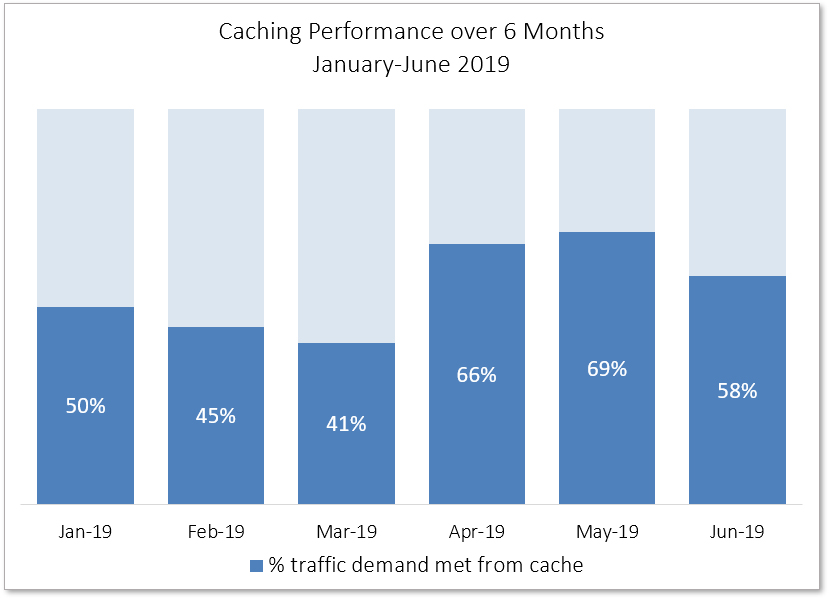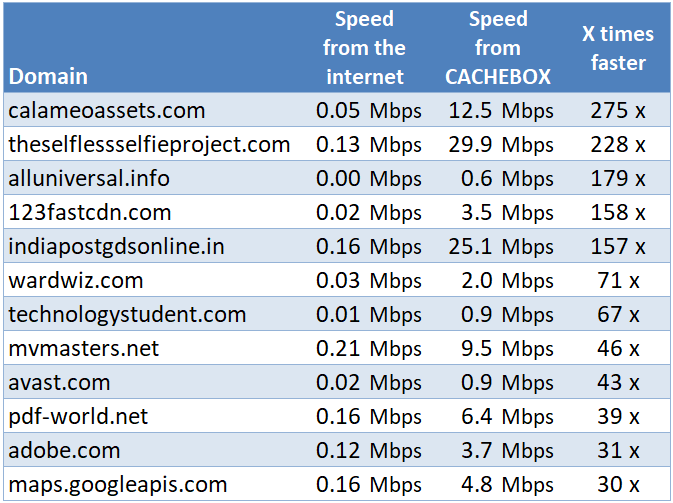Aga Khan Academies
The Aga Khan Development Network (AKDN) is a group of 30 development agencies,
institutions, and programmes aimed at achieving a better quality of life across the
poorest parts of Asia and Africa.
The network governs more than 200 schools worldwide and aims to develop leading
Academies in key locations across the region. The first three academies are fully
operational in Mozambique, Kenya and India.
CHALLENGE
- Slow access to learning content
- Student engagement levels dropping
- Network congested by software updates
- Bandwidth too expensive at some academy locations
- Latency of web content
SOLUTION
- 3 x CACHEBOXes – one at each Academy site in three countries
BENEFIT
- Instant speed improvements in class
- Enhanced user experience
- Congestion-free access to content
- Affordable, cost-effective boost to classroom connectivity
- Slow content delivered much faster
Insufficient bandwidth brings congestion and slow access
Students and teachers at each academy rely heavily on fast access to online learning
content throughout the day. But each location differs in its network capabilities, as well
as user equipment. In some locations students access the internet from computer labs, in
others from individual user devices in the classroom.
For e-Learning to be successful, content must be accessed quickly. The academies
in Mozambique and Kenya however can’t access the bandwidth capacity needed
to support an increasing number of internet-enabled devices, such as iPads or
Chromebooks.
With smaller internet connections these academies often experience congestion. As
classes of students access the same content online, they do so at the same time. This
creates huge spikes in demand which saturate the network, leaving students queuing
for content and facing lengthy page-load times. With students kept waiting, lesson
plans suffer, as do engagement levels. Growing frustration risks students and teachers
abandoning online lessons altogether.
Content slow to arrive, even on high capacity links
In India, the Hyderabad academy enjoys access to higher capacity connections – but
even with far more bandwidth some key content still arrives slowly in the classroom.
This is due to a host of factors from transmission latency to slow servers upstream – and is
beyond a school’s control. Even with unlimited bandwidth, users can still experience slow
content delivery. This leaves Hyderabad with the same problem – delays in the classroom
and unhappy students.
Capacity consumed by device updates
All three academies share a problem caused by growing device numbers. As the
number of classroom devices increase, so does demand for the operating system
updates needed to maintain them and keep them secure.
Often many gigabytes in size, these files are requested frequently and at random, by
each and every device on the network. Typically served from slow web servers, they can
‘hog’ most of a school’s bandwidth throughout the school day – restricting access to
more vital learning content.
Congestion-free with CACHEBOX
Turning to caching to help resolve these bandwidth issues, Global Head of IT Sanjeeb
Mohanty was delighted to discover a schools-focused caching solution that specifically
handles schools’ content – CACHEBOX.
CACHEBOX is a specialised solution, engineered for schools. As a result, it is the best tool
for the job in schools.
CACHEBOX saves a copy of requested internet content locally, then serves it via the
Local Area Network (LAN), meeting all subsequent demand directly. That means the
majority of requests don’t need to access the internet – slashing demand, eliminating
congestion and making content faster. This drastically minimises the capacity a school
needs to deliver an optimal e-learning experience.

With CACHEBOX, Mozambique has enjoyed consistently high caching performance. A review of the first six months of 2019 shows CACHEBOX serving substantial quantities of monthly content from cache – often well over 50%.
By freeing up so much bandwidth, CACHEBOX enables the academies to expand online curriculum, confident that students can access it, congestion-free.
“CACHEBOX has worked very well and helped to slow down the rate of bandwidth
upgrade, which we are pleased about,” says Sanjeeb.
Faster content with CACHEBOX
With no waiting for content to download from the internet, previously slow web content
arrives many times faster.
Hyderabad’s higher bandwidth capacity failed to accelerate slow web content, but with CACHEBOX content now arrives up to 216 times faster.
With classroom speeds accelerated, the academies can provide a more seamless, enhanced user experience. Pushing student engagement levels to new highs, CACHEBOX is helping deliver the best chance for learning success.

“Wherever a school is located, or however cheap bandwidth is, CACHEBOX gives
students fast access to content that the links alone never could,” explains CACHEBOX
Consultant Harminder Heer.
Updates offloaded with CACHEBOX
Schools worldwide are finding that one source of online traffic dominates: large, frequent
software update files from operating systems and software vendors. A school with lots of
student devices – particularly one with a 1:1 scheme – will typically find that more than 50%
of its bandwidth is consumed by software updates.
Aga Khan Academies chose CACHEBOX because it caches software updates from all
vendors on all platforms, including Apple, Microsoft, ChromeBook and antivirus updates.
In September 2019, user devices at the Academy of Mombasa requested over 2TBs of updates alone. This accounted for more than 70% of total downloads for the entire month.

But thanks to CACHEBOX, up to 88% of it didn’t need to come from the internet. The vast
majority of update content was served direct from cache. And, served at much faster LAN
speeds, cached updates clear the network faster – leaving student access unaffected.
Caching reports from each academy show CACHEBOX removing gigabytes of software
downloads from their internet links, giving them the confidence to add more devices
without worrying about congestion or another bandwidth upgrade.
The future looks better with caching
With e-learning plans expanding, the academies want to maximise student access and
engagement opportunities. So each academy plans to offer BYOD (Bring Your Own
Device) access to their network. Bandwidth needs will inevitably increase, but as each
Academy expands its network capabilities, CACHEBOX will upscale in line with need.
The CACHEBOX range includes models at different price/performance points so each
location can closely match traffic-load and avoid spending on performance it doesn’t
yet need.
Sanjeeb is confident caching will help deliver the optimal user experience across each
campus at lowest cost. “The Academies understand that CACHEBOX is now a key part of
their strategy and will upgrade their units as they grow,” says Sanjeeb. “This works well for
them, so they don’t need to invest in larger units until their network demands it.”
![]() Download Aga Khan’s case study (478KB)
Download Aga Khan’s case study (478KB)
